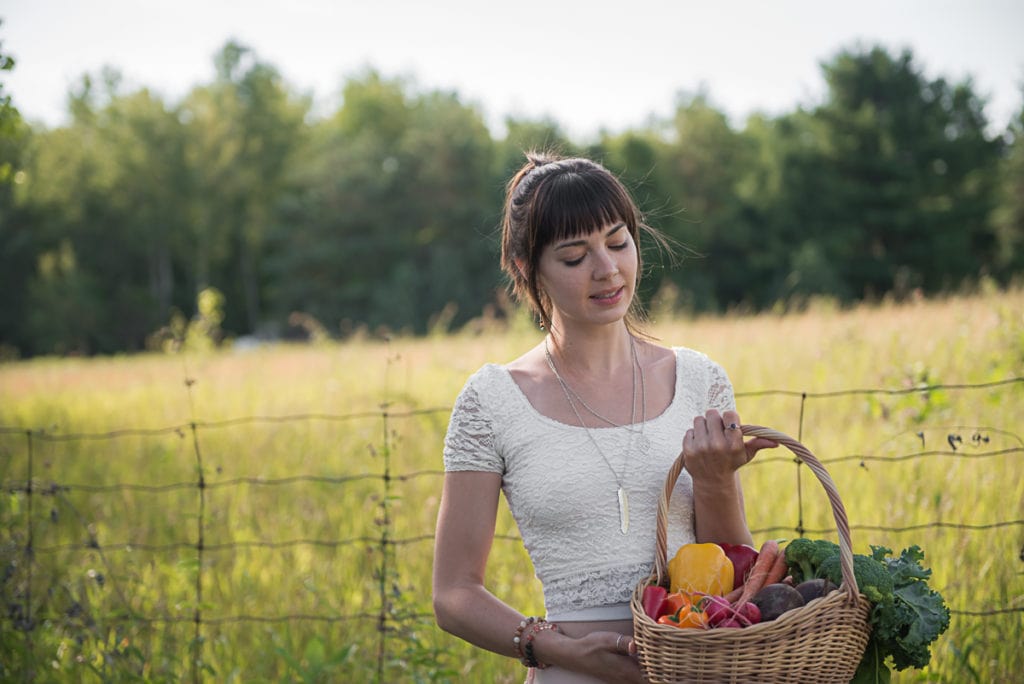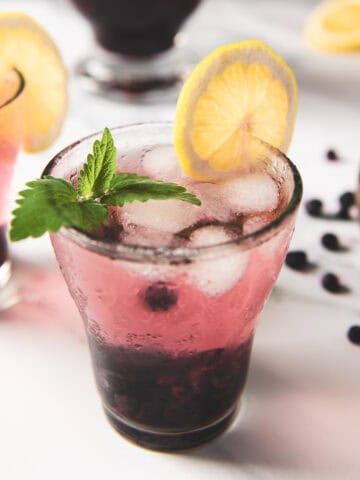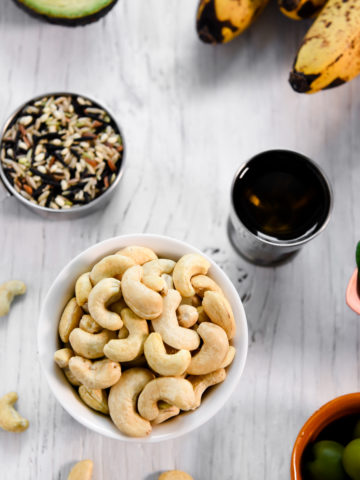The contents of this article are human-created.
This post may contain affiliate links. Please see my full disclosure for details.
Is organic food really worth it? Learn the difference between organic vs. conventionally grown foods and how to make the healthiest choices for you and your family.

*Nutrition Disclaimer: The information provided on this site is designed for educational purposes only. You should not rely on this information as a substitute for, nor does it replace professional medical advice, diagnosis, or treatment. Please read my disclaimers page for more information.
Organic. What Does it Even Mean?
The official definition:
Or-gan-ic (adj.)
1. relating to or deriving from living matter
2. produced or involving production without the use of chemical fertilizers, pesticides, or other artificial agents.
How Organic Food Is Grown
I hear many say that organic is just a scam to charge more money, which, in some cases, is probably true. However, in order to hold the USDA Organic Certification, there are rules and regulations that must be adhered to. They don't make it easy or cheap for growers and farmers to obtain this certification.
While organic isn't always 100% free of contamination, the toxicity levels are significantly lower.
Rules and Restrictions for Growing Organic
- No GMOs. The organic certification prohibits the use of genetically modified organisms.
- No synthetic pesticides and herbicides (such as glyphosate) can be sprayed on the seeds, soil or crops. Organic compounds may be used.
- No human sewage can be used as "fertilizer."
- No growing on contaminated land. The land must be free of prohibited substances for at least three years before it can be certified as an organic farm.
- Solid barriers must surround the land (such as trees or a fence) to protect the crops or animals from blowing contaminants.
The Organic Council has some great information on Canada's organic certification if you would like to learn more
The food you eat can either be the safest and most powerful form of medicine or the slowest form of poison - Anne Wigmore
How Conventional Food Is Grown
Conventionally farmed foods are not subject to nearly as many restrictions and regulations. Conventionally farmed foods face fewer restrictions and regulations. Many large farms receive payments to employ practices that harm farmers, surrounding ecosystems, neighbours, and consumers.
That being said, not all non-organic farmers engange in harmful practices. As mentioned above, getting and maintaining the certification is quite costly. So, it is important to get to know the farmers in your local community and ask them what practices they use. Many small farmers and growers essentially grow organically, but the cost of the certification is just not worth it for them.
Common Conventional Farming Practices
- Heavy use of synthetic pesticides and herbicides (such as glyphosate), which are known carcinogens.
- Use of GMOs. This can be in the form of genetically modified animals that grow unnatraully fast or genetically modified seeds designed to be resistant to unnatural growing conditions and heavy amounts of herbicides.
- Use of city sewage as "fertilizer."
- Monocrop farming that depletes land and destroys ecosystems.
- Growth hormones and antibiotics are often used in large factory farms.
- GMO feed is often used as a cheap way to feed animals and factory-farmed fish.
Top Reasons to Choose Organic
- Reduce chemical exposure.Using organic products can limit exposure to synthetic pesticides and herbicides, as well as chemicals that may leach from soil and city sewage sludge. By making this choice, you can decrease your intake of toxins and harmful compounds that may be carcinogenic or contribute to inflammation, leaky gut, and degenerative neurological disorders.
- Avoid GMOs. Genetically modified organisms, which include various animals and seeds, undergo alteration from their natural state to grow faster, endure unnatural growing conditions, or resist high levels of pesticides and herbicides. Since few studies examine the harmful effects these modifications may have on the human body, we effectively become the test subjects.
- More nutritional value. Since organic foods are typically grown in better soil and natural environmental conditions, they often offer more nutritional value. Choosing local and fresh-picked produce is the next best thing to growing your own food.
- Vote with your dollar. The more we buy organic foods, the stronger the message it sends to farmers, growers, big corporations and the government that we don't want poison in or on our food.
Every time you buy organic, you're persuading more farmers to grow organic - Mother Earth News
When Not to Buy Organic
Small, local regenerative farmers. As mentioned above, it may not be worth it for small growers and farmers to obtain the certification. However, many use regenerative farming practices that closely match and often go above and beyond organic farming.
Follow the Clean 15 list by EWG. This is a great way to save money by not shelling out the bucks for the organic label on foods that generally are not sprayed with pesticides and herbicides.
Greenwashed foods. Because so many of us have been voting with our dollars, opting for organic foods, there has been a rise in greenwashing. If you're unfamiliar with the term or how to spot it, read the explanation below.
What is Greenwashing?
Greenwashing occurs when brands label products misleadingly, such as "all-natural." Some natural ingredients can be detrimental to our health. On top of that, many processed products obtain an organic label when only a small percentage of ingredients are organic. This is most seen in factory-processed "health foods."
Ways to Spot Greenwashed Foods
The best way to spot greenwashed foods is by reading the ingredient list. Watch out for the following not-so-healthy ingredients that are commonly found in processed "health foods."
Seed oils (such as canola, grapeseed, sunflower, and safflower) are often used in processed, factory-made "health foods." Manufacturers extract these oils at extremely high heat, destroying their nutritional value and making them highly inflammatory. They are known to contribute to heart disease, cancer, and other chronic illnesses. I know it can be difficult to completely avoid products with these oils. But, whenever possible, it is best to stick to products that use extra virgin olive oil, pure avocado oil or unrefined coconut oil.
Natural flavour is often misleads people into thinking they're choosing a healthier option. However, these "natural" flavours often come from chemical compounds created in a lab. Look for flavours that clearly specify the fruit or vegetable they are derived from.
Glucose and fructose are highly processed sugars that are no longer in their natural state. They can cause high spikes in blood sugar, which can lead to energy crashes, hormone imbalances and diabetes. Foods sweetened with natural cane sugar, coconut sugar, pure maple syrup, fruit, or fruit juices are a much better option.
Cellulose fibre is often added in products labelled as "plant-based" or "gluten-free." Typically derived from woody plant pulps, this type of fibre comes from plants we don't usually eat or digest.
Extensive ingredient lists are often a sign that not all ingredients are organic. Only a percentage of ingredients have to be organic for a product to claim it on the label.
References
EWG's 2019 Shopper's Guide to Pesticides in Produce. (2019) Retrieved from https://www.ewg.org/foodnews/clean-fifteen.php
Government of Canada (2018, March) Organic Production Systems Permitted Substances List. Retrieved from http://publications.gc.ca/collections/collection_2018/ongc-cgsb/P29-32-311-2018-eng.pdf
Hard, V. (n.d.) 10 Reasons You Should Choose The Organic Food Label Over the Non-GMO label. Retrieved from https://foodrevolution.org/blog/why-choose-organic/
Peluso, M. (n.d.) Carotenoids Found in Tomatoes. Retrieved from https://healthyeating.sfgate.com/carotenoids-found-tomatoes-6020.html
Samsel, A., Seneff, S.(2013, April 18) Glyphosate's Suppression of Cytochrome P450 Enzymes and Amino Acid Biosynthesis by the Gut Microbiome: Pathways to Modern Diseases. Retrieved from https://www.mdpi.com/1099-4300/15/4/1416
Top 10 Reasons to Go Organic (n.d.) Retrieved from http://www.onlyorganic.org/get-facts/top-10-reasons-to-go-organic/
What are Canada's Organic Standards? (n.d.) Retrieved From https://www.organiccouncil.ca/organics/standards-regulations/





Rate this Recipe & Share How it Turned Out!